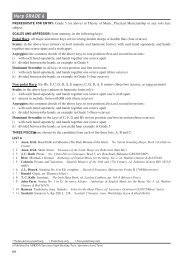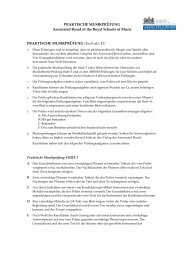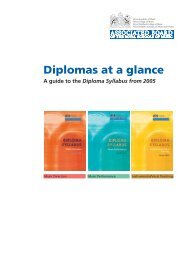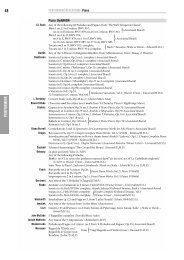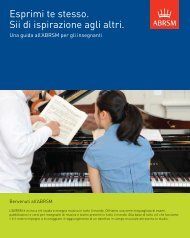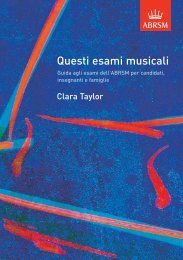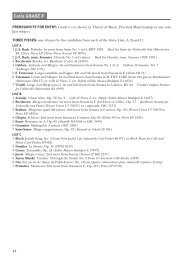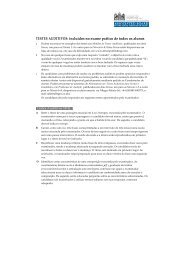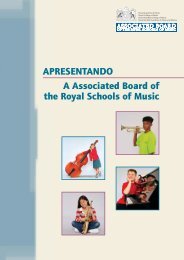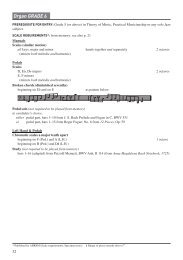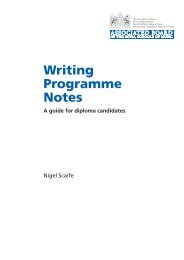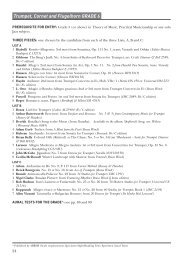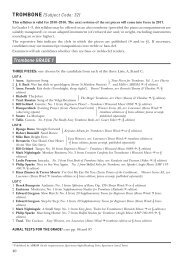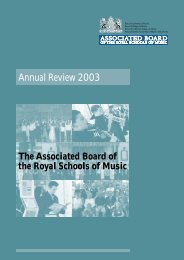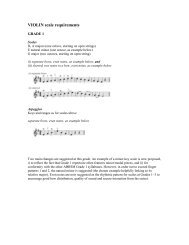LIBRETTO - ABRSM
LIBRETTO - ABRSM
LIBRETTO - ABRSM
You also want an ePaper? Increase the reach of your titles
YUMPU automatically turns print PDFs into web optimized ePapers that Google loves.
2<br />
Are you<br />
examiner<br />
material?<br />
EXAMS Examiner training<br />
We welcome applications<br />
from musicians who<br />
would like to join the<br />
panel of examiners.<br />
If you are based in the<br />
UK and would like to be<br />
considered as a potential<br />
member of this very<br />
special group of<br />
musicians, please<br />
request an application<br />
form from Philip<br />
Mundey, Director of<br />
Examinations, at our<br />
Portland Place address.<br />
Correction<br />
The simplified rubric<br />
now in use for the Aural<br />
Tests at Grades 1 to 3<br />
was unfortunately<br />
misquoted in the last<br />
edition of Libretto. It<br />
should have read:<br />
You may find it<br />
helpful to know, when<br />
preparing your pupils<br />
for the Aural Tests at<br />
Grades 1 to 3, that when<br />
examiners announce the<br />
D Test elements they<br />
simply refer to ‘smooth<br />
or detached notes’ and<br />
‘loud and quiet playing’<br />
rather than to<br />
articulation, contrasted<br />
dynamics and gradation<br />
of tone.<br />
Philip Mundey provides another<br />
glimpse into the world of the<br />
Associated Board examiner,<br />
looking this time, with<br />
Clara Taylor, at training and<br />
moderating.<br />
In the last issue I wrote about<br />
the Associated Board’s<br />
philosophy of generalist<br />
examining. The article provoked<br />
an unusually large postbag,<br />
with all but one letter<br />
expressing support for the<br />
principles which underlie our<br />
music exams. Here the focus<br />
shifts to the initial examiner<br />
training and to the monitoring<br />
which then follows, year in and<br />
year out. Clara Taylor, our Chief<br />
Examiner, leads the process:<br />
‘We provide rigorous<br />
training for potential examiners<br />
and once accepted on to the<br />
panel, they undergo regular<br />
moderations, seminars and<br />
marking exercises. Training<br />
takes place over two-and-a-half<br />
days at Portland Place, followed<br />
by four days ‘on the road’ with<br />
individual trainers. During the<br />
initial days trainees are<br />
introduced to the philosophy of<br />
examining, the importance of<br />
putting candidates at ease, the<br />
All about funding<br />
David Hoult, Principal of Leeds College<br />
of Music, shares his knowledge and<br />
experience of current funding issues.<br />
Readers of Libretto will recall that<br />
Associated Board exams were<br />
recently accredited by the<br />
government’s Qualifications and<br />
Curriculum Authority (QCA), as<br />
part of the National Qualifications<br />
Framework (NQF). This inclusion<br />
of Associated Board exams in the<br />
NQF is well known, but there<br />
seems to be less awareness of its<br />
implications for funding. In<br />
England this is the responsibility<br />
of the new Learning and Skills<br />
Council (LSC). There are similar<br />
arrangements through separate<br />
bodies in Wales and Northern<br />
Ireland, with different<br />
arrangements in Scotland. The<br />
LSC was established last year as<br />
the successor to the Further<br />
Education Funding Council and<br />
the Training and Enterprise<br />
Councils. It funds all education<br />
and training for young people<br />
aged 16 and over, and also for<br />
adults - everything except Higher<br />
assessment criteria and the<br />
administration of aural tests;<br />
they experience the procedures<br />
involved in every aspect of the<br />
exam. It can be a steep learning<br />
curve but gives a secure<br />
foundation on which to build<br />
future skills.<br />
‘Once out examining with<br />
individual trainers, the trainees<br />
observe and administer exams,<br />
the latter in increasing amounts<br />
as the days progress. There are<br />
then opportunities for review<br />
and discussion before the final<br />
day, when I am usually present<br />
to observe the trainee<br />
administering all the exams.<br />
‘Ongoing professional<br />
development is then crucial.<br />
There is no room for<br />
complacency and we strive to<br />
refine skills through seminars<br />
and regular visits by<br />
moderators. Moderation in<br />
the exam situation is vital<br />
and significantly contributes to<br />
the consistency of the panel.<br />
Education, which has its own<br />
funding councils. The LSC will<br />
fund any qualification listed<br />
under Section 96 of the Learning<br />
and Skills Act 2000, and now,<br />
thanks to QCA accreditation,<br />
Theory and Practical Grades 1 to 8<br />
are included in the list as<br />
approved for funding.<br />
So what’s the snag? Well,<br />
predictably enough, there are<br />
strings attached. Firstly, the LSC<br />
only funds organisations: colleges,<br />
training providers, and – from this<br />
September - school sixth forms. It<br />
does not provide funds directly to<br />
teachers or students. So here at<br />
Leeds College of Music, and no<br />
doubt at other colleges too, we<br />
have been able to access the new<br />
funding quite easily. Secondly, the<br />
LSC does not fund exams for<br />
young people aged under 16 and<br />
finally, funding is not especially<br />
generous. It should cover the cost<br />
of teaching theory to small groups<br />
New examiners are moderated<br />
within their first year of<br />
examining and established<br />
members of the team are<br />
usually visited every two years.<br />
‘The professional discipline<br />
and skill needed to make the<br />
exam a positive experience for<br />
all candidates must be in place<br />
for every member of the panel;<br />
the examining must always be<br />
fair and consistent regardless of<br />
circumstances. We receive very<br />
few letters expressing concern<br />
over results, but such concerns<br />
are always thoroughly<br />
investigated as part of our<br />
quality assurance procedures.’<br />
Clara Taylor gives a clear<br />
picture of the importance we<br />
attach to the quality of the<br />
examining panel, and of some<br />
of the resources we bring to<br />
bear in maintaining it. This is<br />
further enhanced by a thorough<br />
statistical analysis of the results<br />
of every examiner at least three<br />
times a year. Summing up, Clara<br />
comments that ‘these selection,<br />
training and moderation<br />
processes are central to<br />
maintaining our position as<br />
the examining board with the<br />
greatest world-wide reach and<br />
the strongest reputation for<br />
quality assurance.’<br />
but would not run to the<br />
additional expense of individual<br />
instrumental or vocal tuition. And<br />
there are restrictions on the<br />
charging of fees, so it would not<br />
normally be possible to make up<br />
the shortfall in LSC funding by<br />
charging a top-up fee to students.<br />
If these drawbacks are not<br />
enough to cope with, there’s one<br />
more: the bureaucracy. Anyone<br />
who gains LSC funding for graded<br />
exams can expect a small army of<br />
auditors, OfSTED inspectors,<br />
quality assessors and target<br />
setters to come knocking on the<br />
door asking to see your<br />
performance indicators. Still<br />
interested? Well, good luck – and<br />
don’t say I didn’t warn you!<br />
Colleges wishing to<br />
know more about how<br />
to access LSC funding for<br />
graded music exams<br />
should make enquiries<br />
at their local LSC office,<br />
see www.lsc.gov.uk<br />
or telephone the<br />
LSC Helpline on<br />
0870 900 6800.



